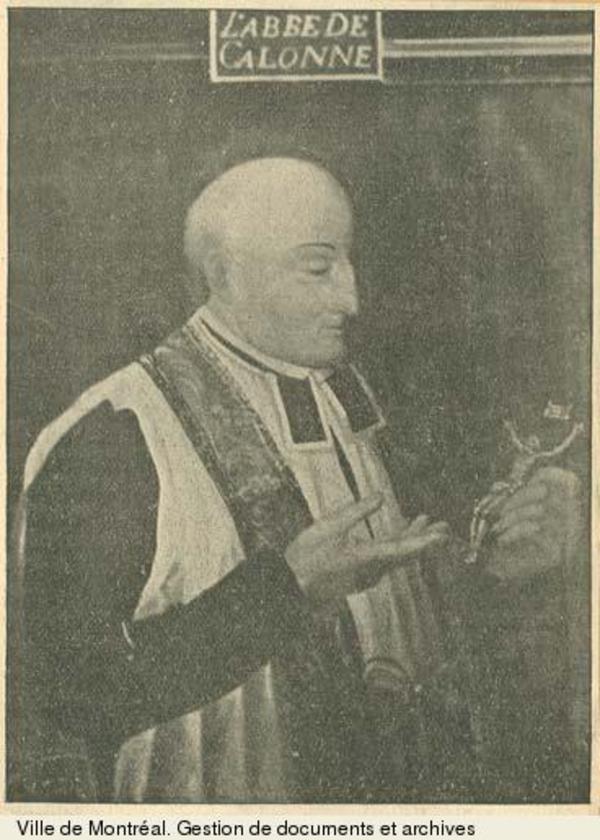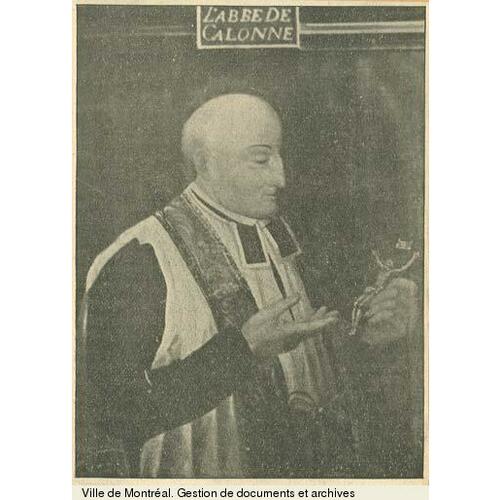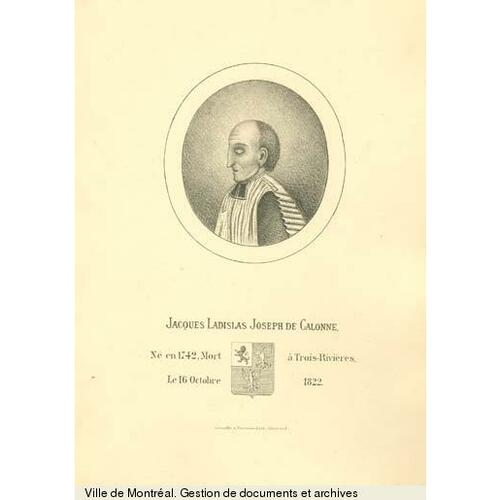
Source: Link
CALONNE, JACQUES-LADISLAS-JOSEPH DE, Roman Catholic priest; b. 9 April 1743 in Douai, France, son of Louis-Joseph-Dominique de Calonne and Anne-Henriette de Franqueville; d. 16 Oct. 1822 in Trois-Rivières, Lower Canada.
In the 15th century the Calonnes were still an ordinary bourgeois family of limited means living in Tournai (Belgium). Through their interest in the law and the church, they began to rise in society. The titles of squire and knight appear successively within the family during the 17th century. Jacques-Ladislas-Joseph had a pampered childhood and a happy adolescence. In 1768, having finished classical studies and a law course, he became a counsellor in the parlement of Flanders, where his father served as president and his brother Charles-Alexandre also held a position.
The parlements were abolished in 1771 and although they were revived in 1774, Jacques-Ladislas-Joseph had in the mean time decided to enter the Grand Séminaire d’Arras, in France. The bishop of Arras did not think him well suited to the ecclesiastical state, considering him as frivolous as he was brilliant. Admittedly he was a talented young man, dignified in his bearing and movements, tactful and discreet in conversation, all qualities that constituted the gentleman and man of the world as much as the man of the church. In view of this, his father and the bishop of Arras sent him to the Sulpician seminary in Paris where no time was lost in setting him to the study of theology and Holy Scripture, with the result that he was ordained priest on 1 June 1776. He went to Cambrai, received a canonry, and became vicar general and official of the diocese. Some time later he declined the office of bishop, but when his brother, who had become controller general of Finance in 1783, that year obtained the abbey of Saint-Père in Melun for him he could not refuse, although he would have preferred the office of king’s librarian.
As an abbot Calonne had an income only slightly smaller than that of a bishop, and fewer responsibilities. He took an interest in the financial management of his abbey. During this period he was often in Paris and Versailles, and frequented the court and literary circles there, becoming a friend of Beaumarchais and of the reformers’ group. His brother, who had presented a plan for financial reforms, failed to obtain the support of the Assembly of Notables, fell into disgrace, and had to leave for England in 1787; Calonne went with him. When elections to the Estates General were called, they returned to France. Although Charles-Alexandre was declared ineligible, Jacques-Ladislas-Joseph was elected for the bailiwick of Melun. Late in July 1789 he was arrested, but he was released fairly quickly and emigrated to England, where he rejoined his brother. From then on he led a hectic life dedicated to the counter-revolution; he wrote and published the Courier de l’Europe (printed in Paris, Boulogne, and London), travelled to Prussia and Italy, and dealt with matters of law and finance for the army of the princes, in the space of a few years ruining himself to the extent that he was sued for debt.
In 1799 Calonne decided to leave with a small group of emigrés to develop lands his brother had received on Prince Edward Island that year. From the day he arrived, his main responsibility as a priest was for the Irish settlers; Amable Pichard* served the Acadians and Angus Bernard MacEachern the Scots. He engaged in exemplary missionary activity, visiting the settlements and the faithful, seeking to understand the needs of various ethnic groups; he even wrote to the bishop of Quebec, who had episcopal jurisdiction over him, that the Indians, as the original inhabitants, had a better claim than anyone else to the small island of Lennox in Malpeque Bay. He went without hesitation to New Brunswick to carry on a ministry. Despite some effort he did not succeed in attracting the Trappists to Prince Edward Island.
During his episcopal visit in the summer of 1803 Bishop Pierre Denaut* met Calonne at Richibucto and invited him to move to Quebec. But Calonne was obliged first to return to England and reach an understanding with his creditors, who had been harrying him since his brother’s death the previous year. Thus he spent three years in Liverpool doing parish ministry while settling his affairs and waiting for permission from Lieutenant Governor Sir Robert Shore Milnes* to go to Lower Canada. The permission came in 1807, and in October he landed at Quebec. Bishop Joseph-Octave Plessis immediately named him spiritual director and chaplain of the Ursulines at Trois-Rivières, as well as priest in charge of the parish of La Visitation at Pointe-du-Lac.
Despite his 64 years Calonne enjoyed good health, and he carried a heavy load. At the Ursuline convent he looked after ministry to the nuns and novices, the boarding and day pupils, and also the sick, since the only hospital in the region was under its roof. Although he was the parish priest at Pointe-du-Lac, he rarely stayed in the presbytery. On Sundays, after saying mass in the convent he would travel by carriage to his parish nine miles away, and celebrate a second mass, preach, conduct the catechism class, and sing vespers. He did not give up his parish charge until ten years later. The priest who had once received generous prebends and had lived in the midst of splendour, gave the income from his tithes to the poor and bought wheat to be ground at his own expense for distribution to the neediest of his parishioners.
In addition to drawing local people to hear him, Calonne used to go to give sermons at the Séminaire de Nicolet, where the superior, Jean Raimbault*, was also an émigré priest. Bishop Plessis brought Calonne to Quebec every year to preach the novena of St Francis Xavier, one of the high devotional periods in the parish of Notre-Dame. He was indeed a preacher with great style, who combined his theological knowledge and his convictions with the most forceful rhetorical devices. When he spoke of the French revolution, he could not restrain himself but declaimed vehemently and even burst into sobs. He was held in equal esteem by French and English, Catholic and Protestant, clergy and prominent laymen; not surprisingly, he had great influence and converted some Protestants. An adviser to whom Bishop Plessis paid attention, he was also the spiritual director of a number of laymen and priests, who came from Quebec or Montreal to consult him. Yet Calonne remained in touch with the changing times in Lower Canada and Europe. He was, for example, one of the first to read Hugues-Félicité-Robert de La Mennais’s Essai sur l’indifférence en matière de religion, published in 1817. In November 1819 he made use of this work in an article for the Gazette des Trois-Rivières that set off a polemic in the other newspapers over Joseph Lancaster*’s monitorial system of teaching, to which Calonne was violently opposed.
During the 15 years he spent in Lower Canada, Jacques-Ladislas-Joseph de Calonne led an ascetic life, fasting every day and wearing a hair shirt and chain belt. The nuns considered him a saint and believed they saw him in ecstasy in the chapel when he was praying there. On 11 Oct. 1822 the priests and prominent people of the Trois-Rivières region came to say farewell to him. He died five days later. He was remembered in oral tradition until the end of the century at Pointe-du-Lac. In 1962 an old Ursuline nun in Trois-Rivières still spoke of “our M. de Calonne,” as if she had known him.
ANQ-MBF, CE1-48, 18 oct. 1822. ASQ, Doc. Faribault, no.209; Fonds Viger–Verreau, sér.O, 081: 24; 0297; Polygraphie, XXXIV: 9d. Francis Hall, Travels in Canada, and the United States, in 1816 and 1817 (London, 1818). John Lambert, Travels through Lower Canada, and the United States of North America, in the years 1806, 1807, and 1808 . . . (new ed., 2v., London, 1816). Caron, “Inv. de la corr. de Mgr Plessis,” ANQ Rapport, 1927–28: 215–316. J.-G. Barthe, Souvenirs d’un demi-siècle ou mémoires pour servir à l’histoire contemporaine (Montréal, 1885). Dionne, Les ecclésiastiques et les royalistes français. Alexandre Dugré, La Pointe-du-Lac (Trois-Rivières, Qué., 1934). Galarneau, La France devant l’opinion canadienne. Robert Lacour-Gayet, Calonne: financier, réformateur, contre-révolutionnaire, 1734–1802 (Paris, 1963). Les ursulines des Trois-Rivières, 2: 437–512. G. Du Chevrot, “M. de Calonne,” BRH, 8 (1902): 283–85. Yvan Lamonde, “Classes sociales, classes scolaires: une polémique sur l’éducation en 1819–1820,” CCHA Sessions d’études, 41 (1974): 43–59. Robert [Philippe] Sylvain, “Louis XVII vint-il en Amérique?” Rev. de l’univ. Laval (Québec), 3 (1948–49): 743–61.
Cite This Article
Claude Galarneau, “CALONNE, JACQUES-LADISLAS-JOSEPH DE,” in Dictionary of Canadian Biography, vol. 6, University of Toronto/Université Laval, 2003–, accessed January 20, 2025, https://www.biographi.ca/en/bio/calonne_jacques_ladislas_joseph_de_6E.html.
The citation above shows the format for footnotes and endnotes according to the Chicago manual of style (16th edition). Information to be used in other citation formats:
| Permalink: | https://www.biographi.ca/en/bio/calonne_jacques_ladislas_joseph_de_6E.html |
| Author of Article: | Claude Galarneau |
| Title of Article: | CALONNE, JACQUES-LADISLAS-JOSEPH DE |
| Publication Name: | Dictionary of Canadian Biography, vol. 6 |
| Publisher: | University of Toronto/Université Laval |
| Year of revision: | 1987 |
| Access Date: | January 20, 2025 |




